
Norah McClintock
Profile by Dave Jenkinson.
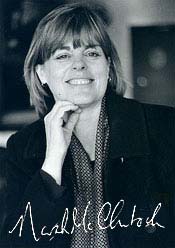
PREFACE: I originally interviewed YA author Norah McClintock in Toronto on October 31, 1992. At that time, Norah had authored four YA fiction titles, with Jack's Back, a mystery, being then the most recent. The results of that interview, "Norah McClintock: Challenging New YA Author," can be found in Emergency Librarian, 20(4), 66-69. Since then, Norah has written seven additional mysteries with three of them, Mistaken Identity, The Body in the Basement and Sins of the Father, being named recipients of the Crime Writers of Canada's Arthur Ellis Award for Best Juvenile Mystery Novel of the Year. Given Norah's critical success in this new genre, I thought it appropriate for another visit and a chat about changes in her writing life.
In 1992, Norah was working full-time at the Centre for Philanthropy, but now, by choice, she's part-time. "I'm working from home now. Eight years ago, the Centre launched a national newspaper for charities, and two years ago I decided to just do the editing and to work from home while doing some freelancing, mostly in the charitable sector. I know the charitable sector well and have developed quite a passion for it and the kind of work that goes on right across the country. And I'm also doing my own writing."
Books by Norah McClintock.
This article is based on an interview conducted in Toronto, ON, on June 9, 2001.
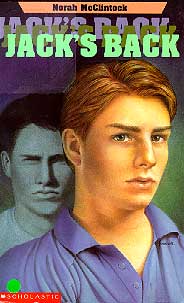
"Back in the early nineties, I had no idea that Jack's Back was the beginning of a series of mysteries. I'd never considered writing mysteries, but I like the genre a lot. I grew up reading all the traditional mystery series, Nancy Drew, the Hardy Boys, and my all-time favourite, a series in which the main characters were a guy named Brains Benton and his sidekick, Jimmy. I read all those, and then I went on to read Dick Francis and Elmore Leonard who is a huge favourite of mine now. I still read a lot of mysteries, but I never considered writing one. I guess I thought it would just be impossible because it seems very complicated and difficult."
"But once I did Jack's Back, I thought I'd like to try again, and I found that I really liked doing it." In talking about her approach to writing in 1992, Norah had said, "I hate outlines." Well, that was then. "Boy, am I planner now! Sometimes before I even start, I have a 20 page outline. It's a new way of working for me, but in a mystery, you have to keep all the details straight. You've got the figure out the hidden story and then the surface story. The biggest challenge often is, 'How can someone who is 15 or 16-years old legitimately get a grip on the story?' I'm happy that I stumbled into mysteries and gave it a try. I was surprised to win my first Arthur Ellis Award because, at the time, I didn't even know that the Crime Writers of Canada existed. I got a call from Scholastic saying that I'd been shortlisted for this award. I had to do a little research to discover what it was. I certainly never expected to win."
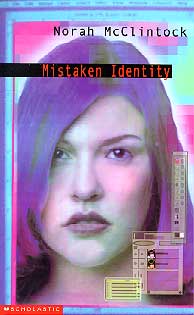
"While the settings of some of the books are 'anywhere,' with Mistaken Identity, my next mystery after Jack's Back, I had to go south of the border because I included the Secret Service. It's hard to say where the plot for that one originated. When it's time to do something different, I will take long walks and come up with a bit of an idea. For this one, I liked the idea of somebody not being who they think they are. With a couple of books, including this one, I go through a process where I ask: 'What's something really bad that could happen to somebody? What could make it even worse? How could you make it the worst possible thing that you could conceive of?'"
"'It's bad if someone you love dies. In this case, what's worse than a member of your family, especially if it's the only member of your family that you know? It's bad that Zanny's father has died. Zanny's coping with that could in itself be a book. But what would be worse than your dropping dead of a heart attack or dying from an illness? Somebody actually consciously makes a decision to kill somebody else.' To my mind, that's even more traumatic. All of a sudden, you're in a world where people will take a conscious decision to end a person's life and you have to cope with it. And since Zanny doesn't have relatives that she knows of, she's on her own. 'Okay, now is there anything worse than that? What if it turns out that everything you thought about your world is not true at all and, in the midst of everything else that's happening, you have to reevaluate everything that you know about yourself and the person you loved and trusted the most in your life. That's how Mistaken identity developed. It started out as a bit of a game: how to make a bad situation as bad as I could possibly make it, and then put this young woman into that and have her deal with it."
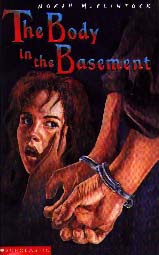
"The Body in the Basement was based on something that really happened. There was a car dealership in my neighborhood. It was a landmark in Toronto and had been there since 1949. It was a place that we knew very well and had bought a couple of cars there ourselves. One day, when they were tearing the place down, there was a tiny article in the Toronto Star, I think on page 2, just saying that, as they were excavating under this place, they had found a skeleton. Later, there was a follow-up article saying that it had probably been there since about 1949. Nobody had any idea who it was, and that happening, probably because it was just two or three blocks from my house, got my interest to begin with. Then I started thinking. 'Somewhere out there in this big world, there's someone, I don't know who, who must have been wondering all this time whatever happened to so and so.' Then, whenever I get an idea like that, I start thinking, 'OK, if the person who is wondering is 15-years-old, what can I do with this story?' And I take it from there.""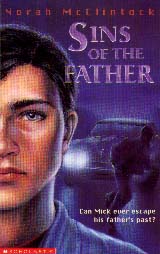
The genesis of Sins of the Father was a writing exercise. "Years ago, before my first book was even published, I took a children's writing course at Ryerson with children's author Barbara Greenwood. She made us do this exercise where you had to close your eyes and imagine a character standing under a tree. It was funny because at this point I was just getting started and I hadn't even considered writing any books with boy characters, but a 15-year-old boy just popped into my mind, and I imagined him standing under this tree in front of my grandfather's house. Then Barbara said, 'Now describe what that character's doing under that tree.' I started writing about this boy who had been dumped there by his father. He was standing there; he was unhappy; his father was driving away, leaving him with an angry old man who was not happy to have him there. That was it. It was just one scene, and, when we had to read the pieces aloud, I thought, 'Well, it's not bad.'"
"I didn't do anything with it for years and years. Then after Body in the Basement, I was looking around for an idea. For some reason, that character the boy under the tree and that situation just popped into my mind again, and I started thinking more about it. 'Why is he standing there? Why is Dad taking off?' I began coming up with some answers, and that's how the book started. I admit that when Barbara asked us to do the original exercise, I was skeptical. When it comes to creativity exercises, I always think they aren't going to work. But I guess I've been proven wrong."

Norah calls Password Murder "my lame attempt at Hamlet. I really like Hamlet and just wanted to give it a shot to see what I could do. Kids have not made the connection. My editor got it right away, of course, as did my mom. My husband was halfway through the book before he went, 'Hey....' I like the situation that Hamlet finds himself in. I thought, 'How could I deal with the idea in a modern setting without being too bizarre?' I didn't want Harley to just see ghosts. There's an explanation about that in the book, which is why Harley's originally in the hospital and having some problems coping. I wanted it to raise a question, 'Did Harley really see what he thinks he saw or not? Is that real or not real?' I have no idea how readers interpret the ghost, but I wanted to have it look real to Harley and to have him wonder -- Is this really happening? I want readers to wonder what's driving Harley to find an answer? Is he trying to alleviate his own guilt, or is it something else that just doesn't seem right to him?"
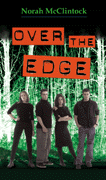
When it came time to write the next mystery, Norah says, "I wanted to do something that it was more Agatha Christie-ish and have several characters who potentially have a motive to bump somebody off. Because I'm always dealing with young people, it was going to be set in a high school. I was playing with what this story could be, trying to set up four characters who had a motive to be involved in something. Originally, the main character was going to be the guy who gets killed at the beginning of Over the Edge, Peter Flosnick. He came to mind first, this weird character who was blackmailing people. Then I decided to turn it around and make him the body."
"Once I did that, I needed a sleuth, and Chloe (from the Stepfather Game) came to mind because she could take it on. I really like Chloe. I can't help it. She's got a bit of attitude, and nothing really fazes her too much. She's got her stepfather, Levesque, who's an ex-homicide cop. I thought, 'OK, I'm going to move the family out of a big city, Montreal, because that setting was just too complicated, and I'll put them in this little fictional town of East Hastings in northern Ontario. Chloe's already ticked off to be there, and she's not that happy about leaving the big city and being in this little town with all these people who have just no idea about what they're missing in life. Then this 'thing' with Peter happens.
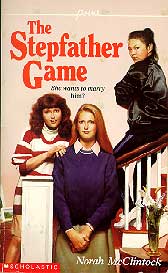
After Over the Edge, I decided to see if I could do another one. I wrote Double Cross, then Scared to Death. I've just finished a fourth one, which will be published in 2002."
With the exception of Body in the Basement, none of the mystery book titles are Norah's. "I'm proud that I came up with one title that stuck. I thought I was a 'title' person, but apparently the marketing department doesn't agree with me. To be honest, I couldn't come up with a title for what became Password Murder. I have a good title to start with, or I don't. And if I don't, then I can live with it. I wanted to call Scared to Death 'Bye-Bye Love' which is why it's dedicated to 'Phil and Don' (the Everly Brothers) 'who knew all about love and loss,' but I couldn't get permission to use the little snippet of song. The dedication was the only thing I could do to still keep that original idea in there. This is really a story about Ross and his love for unattainable Tessa, who ends up dead. I like poor old Ross. He's kind of a nerd, but he's OK. Chloe likes him, too as a friend."
When Norah resurrected Chloe, she had not planned to have her as a continuing amateur sleuth. "I just play around from book to book. It never occurred to me to do a series, but, to be honest, once I had her back, I thought, 'There's a few more stories in this town, and I do enjoy playing with her,' and so I decided I'd give her another shot. But I don't know how many I'm going to do."
With three, soon to be four, Chloe mysteries in print, Norah admits to some anxieties. "I have a little bit of concern about the 'Cabot Cove' syndrome. East Hastings is supposed to be a sleepy little town, but the body count is mounting and it's fast becoming the murder capital of Ontario. Everybody says I should take Chloe on holidays. I thought in Scared to Death that I was going to get Levesque fired and then the family could go some place else, but I didn't in the end. Then there's the 'Nancy Drew question.' How much can Chloe age? How do you deal with that very difficult issue? I guess there are two ways of looking at it. Chloe can be involved in just so many mysteries and then that's it, or you just count on your readers to say, 'It doesn't matter. She'll be this age forever.' I'm not very comfortable with the latter choice.
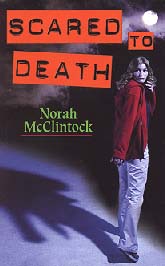
"East Hastings High School is a big school, but there are some characters, like Ross and Eric, who keep showing up, and I've got to keep track of those darn teachers. With Scared to Death, I was still carrying all the details about these characters and the community in my head. Then my editor said, 'I'm having trouble sorting things out. It would be helpful if you could give me a map of what this town looks like.' I said, 'Yeah,' but didn't do anything about it. Then she said, 'I really need a map to sort this out.' I thought, 'OK, fine. I'll do a map.' I started re-reading the three books to see where the events and places were in relation to each other. That's when it dawned on me -- this is not going to work. I was sitting at the dining room table with this huge piece of paper, trying to plot things out according to what I had already written. I was going crazy and had to get my husband involved. It was so complicated trying to lay out the town so that it didn't contradict anything that I'd already written. But having done it, I must say it's very useful because, when I was writing the fourth book, I could just pick up my map. 'Helpful Tip' to any writers out there: If you do more than one book in the same town and your editor's the kind of person who wants a map, think about doing the map first."
"In the fourth book, I've brought back one of the four characters from Over the Edge. In the first book, I got rid of Brynn, the older half sister, by sending her off to college, but that's got potential. Chloe could visit. I had to get Mom out of town for the fourth book, so she went to Montreal to visit Brynn. Chloe's also softening a little bit towards Phoebe, her younger half sister, but I don't want her to get mushy. Phoebe's blossoming in this small town while Chloe's feeling really constrained."
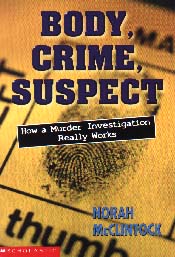
"I have a new nonfiction book out, Body, Crime, Suspect, about what really happens in Canada when somebody is found murdered: what happens, who gets involved, what exactly do they do, what's the sort of sequence of events. The idea for the book came from one of my children, who is a Law and Order fanatic. We watch it together every Wednesday night, and she always says things like, 'Would that really happen?' or 'I want to be a District Attorney and kick ass.' And I'd said, 'Well, you're going to have to move first because we don't have District Attorneys in Canada.' Those conversations started me thinking. If she had questions, I was sure a lot of kids want to know the same thing. So I made a proposal to Scholastic and they liked it."
Unlike before, Norah now writes everything on a computer, and, as previously noted, she does a lot more planning. "Sometimes it takes as long to plan a book as it does to actually write it. I try to stop myself from starting to write it until I know exactly how the story's going to end because, with a mystery, you can get off-track. Not so long ago, I wrote three-quarters of a book and then realized that it wasn't working. It looked good at the beginning, but I didn't have it completely nailed down and it went off the rails. Now I spend the time beforehand asking: What's the crime that actually happened? Who actually did it? How did they do it? How did they manage not to get caught so far? Who are some of the other people who conceivably could have something to hide? I work that out first. I make sure I have a crime that makes sense and somebody who has done it for a good reason and has managed so far to get away with it. Sometimes that's hard. People don't just go killing people willy-nilly. There has to be some logic to it."
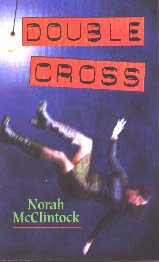
"The sleuth is usually a 15- or 16-year-old who has to somehow have a legitimate reason to be involved or get involved in the mystery at some point and to want to pursue that or be compelled to pursue that right through to the end. How is somebody with a limited life experience, limited mobility, limited access to all that crime fighting stuff that a police officer or even a private detective might have, how is that person actually going to be able legitimately to figure out who 'dun' it, why and how? Planning is like assembling a big puzzle. The writing of it is actually easier after that."
"When I sit down and write a mystery, though, it's not as if I've got the blueprint and now I'm just hammering nails. It's not quite that mechanical. To a certain extent, the characters can do the unexpected, just not a big unexpected. I still try, and I hope I succeed to some extent, to create a real person. Whatever else is happening in terms of the crime, there are other things going on in their life too. With every Chloe book I've done, by the end of it, she's learned something, or I've discovered a possibility here or there with her that I didn't have when I started to write. I try to get 'into' the character and 'be' Chloe or whoever when I'm writing. I don't want the story to come across as just another puzzle. I want people to like Chloe and to care about the things that she cares about."
Asked if writing mysteries for juveniles poses any constraints, Norah responds, "I try not to think about that at all because then I'd start thinking about all the things you can't do. I'd get a little paralyzed. The only constraints to my mind are those associated with having a 15/16 year-old protagonist. What can 15-16-year-olds legitimately do, and what can't they do just by virtue of their age? They're not professionals, and they just don't have the experience. So I just try to look at the character and what that character can and cannot do. I honestly don't worry too much about whether or not this is the correct thing to do in a novel for this age group. I suspect that, if anybody at Scholastic thought it was a problem, they would let me know. So far that hasn't happened, and so I don't feel too constrained."
In 1992, Norah did some of her own writing at lunch time, but she did more at night. "When I started working out of my home, the plan was that I would have more time to write, but that hasn't quite worked out. I'm a little busier than I would like to be, and so I'm still doing my creative writing at night time. I really would like to spend more time writing. I have a lot of ideas and things I want to pursue and not enough time to do them. There's nothing worse than being without an idea. Boy, am I cranky when I don't have a good idea in my head."
A decade ago, part-time studies towards an MA degree in Medieval Studies were a facet of Norah's life, but even then she recognized that the roles of part-time graduate student and part-time author were in conflict and concluded, "If I feel too torn about writing and pursuing my studies, I do know which way I'll go. I'm more interested in writing." Today, the degree remains incomplete. "What I discovered is that, while Medieval history remains something that I'm enormously interested in, I'm really not that interested in writing academic papers."
As to the future, Norah says, "I have a couple of other things in mind, but they're really not developed. One's not a mystery, and one is maybe a mystery with different characters. And, darn it all, I do have a couple of Chloe ideas still kicking around. I'd like to write more young adult mysteries, and I think I probably will, but I also would like to try a few other young adult things. I just need to carve out the time to be able to do more."
